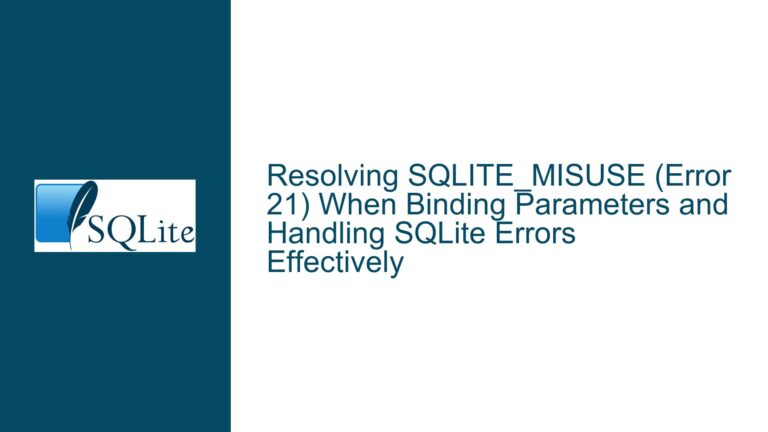Overriding SQLite Built-in Functions via load_extension in EF Core
Understanding Function Override Behavior in SQLite Extensions
Issue Overview: Function Registration Conflicts in Custom Extensions
The core challenge revolves around attempting to override SQLite’s built-in lower() function with a custom implementation provided through a dynamically loaded extension. The extension, named unicode.dll, defines two functions: lower(someString) and nlower(someString), both designed to handle Unicode case folding. When loaded via EF Core’s SqliteConnection.LoadExtension method, the custom lower() function behaves as expected, replacing the built-in ASCII-only lower(). However, invoking SELECT load_extension('unicode'); within an SQL query fails to override the built-in function, leaving the original lower() intact. This discrepancy raises questions about SQLite’s function registration mechanics, extension loading sequences, and runtime environment constraints.
SQLite’s function registration model operates at the connection level. Built-in functions are pre-registered when a database connection is established. Custom extensions can register additional functions or override existing ones, provided their registration parameters (name, argument count, text encoding, determinism) match those of the target function. The conflict arises when the extension’s lower() function does not precisely replicate the signature of the built-in lower(), or when the extension is loaded after the connection has already resolved references to the original function. EF Core’s LoadExtension method may initialize the extension before the connection is fully operational, allowing the override to take precedence. In contrast, executing load_extension() via SQL occurs after connection initialization, where the built-in function may already be locked in due to internal caching or prepared statements.
Possible Causes: Signature Mismatches and Loading Sequence Pitfalls
Function Signature Discrepancies
SQLite distinguishes functions not only by name but also by argument count, text encoding (e.g.,SQLITE_UTF8,SQLITE_UTF16), and flags such asSQLITE_DETERMINISTIC. If the extension’slower()is registered with a different text encoding or argument count than the built-inlower(), SQLite treats them as distinct functions. For example, the built-inlower()usesSQLITE_UTF8and expects one argument. If the extension’slower()is mistakenly registered withSQLITE_UTF16or an optional second argument, no override occurs. Verify the extension’s C/C++ source code for thesqlite3_create_functioncall parameters. A mismatch here would explain why the customlower()coexists with the original instead of replacing it.Extension Loading Order and Connection State
The timing of extension loading relative to connection initialization affects function visibility. WhenSqliteConnection.LoadExtensionis called early in the connection lifecycle (e.g., before executing any queries), the extension’s functions are registered before EF Core internalizes the function set. In contrast, executingSELECT load_extension('unicode');occurs after the connection is active, potentially allowing prior references to the built-inlower()to persist in prepared statements or EF Core’s query pipeline. SQLite does not invalidate existing prepared statements when new functions are loaded, meaning queries compiled before the extension load retain references to the originallower().Extension Entry Point Configuration
SQLite extensions require an entry point function (default:sqlite3_extension_init) to register their functions. If this entry point fails to execute—due to incorrect naming, missing exports in the.dll, or runtime dependencies—the extension’s functions are never registered. While the user reports partial success withnlower(), this could indicate that the entry point is functional but encounters errors when registeringlower(), such as conflicting registrations that SQLite silently ignores. Review the extension’s build configuration to ensure the entry point is correctly exported and that no exceptions occur during function registration.
Troubleshooting Steps: Diagnosing and Resolving Function Override Failures
Audit Function Registration Parameters in the Extension
Inspect the extension’s source code for thesqlite3_create_functioncalls responsible for registeringlower()andnlower(). Ensure the following parameters match the built-inlower():- Name: Exact spelling (case-sensitive).
- Argument count:
1(the built-inlower()accepts one argument). - Text encoding:
SQLITE_UTF8(the default for built-in functions). - Determinism flag:
SQLITE_DETERMINISTIC(sincelower()is deterministic).
Example correct registration:
sqlite3_create_function(db, "lower", 1, SQLITE_UTF8 | SQLITE_DETERMINISTIC, NULL, &unicode_lower, NULL, NULL);If the extension omits
SQLITE_DETERMINISTICor uses a different encoding, SQLite will not override the existing function. Recompile the extension with corrected parameters and retest.Test the Extension in Isolation Using the SQLite Shell
To eliminate EF Core and C# runtime variables, load the extension directly via the SQLite command-line shell:sqlite3 .load ./unicode SELECT lower('TEST'); -- Should return 'test' (Unicode-aware)If the override succeeds here, the issue lies in the application’s runtime environment. If it fails, the extension itself is misconfigured. Use the
.functionsshell command to list registered functions and verifylower()‘s presence and metadata.Profile Function Calls with Debug Hooks
SQLite provides hooks likesqlite3_trace_v2()to log function calls. Modify the extension to log entries and exits fromunicode_lower(), or enable tracing in the application. If the customlower()is never invoked despite being registered, this suggests SQLite’s parser is resolving the function name to the built-in version due to schema caching or collation rules. Forcing a reparse (e.g., by reconnecting or resetting the schema) may resolve this.Preload Extensions Before Connection Pool Initialization
In EF Core, database connections are often pooled. If a pooled connection was previously used without the extension, subsequent uses of that connection retain the original function definitions. Disable connection pooling temporarily or configure EF Core to load the extension upon every connection:optionsBuilder.UseSqlite("Data Source=mydb.db", sqlOptions => { sqlOptions.Connection.Open(); sqlOptions.Connection.LoadExtension("./unicode"); });This ensures the extension is loaded afresh for each connection, overriding
lower()before any queries execute.Fallback to Function Aliasing
If overriding proves intractable, redefine the custom function under a distinct name (e.g.,unicode_lower()) and update EF Core queries to use the alias. While less ideal, this bypasses signature conflicts and guarantees correct behavior. For compatibility with existing code expectinglower(), create a view or use SQLite’sCREATE FUNCTIONcommand (though note that this only works for scalar functions defined in SQL, not extensions).
Final Fix: Ensuring Deterministic UTF-8 Registration with Early Loading
The definitive solution involves two adjustments:
- Correct Function Registration: Recompile the extension with
sqlite3_create_functionparameters that exactly match the built-inlower()(1 argument,SQLITE_UTF8,SQLITE_DETERMINISTIC). - Pre-Query Extension Loading: Use
SqliteConnection.LoadExtensionduring connection initialization, before EF Core internalizes the schema or executes queries. Disable connection pooling if necessary to prevent stale function definitions.
By aligning the extension’s function signature with SQLite’s expectations and controlling the load order, the custom lower() will reliably override the built-in implementation, enabling Unicode-aware case folding across all queries.






